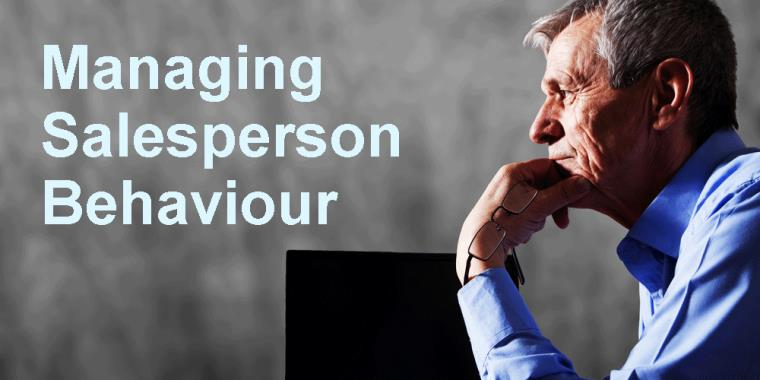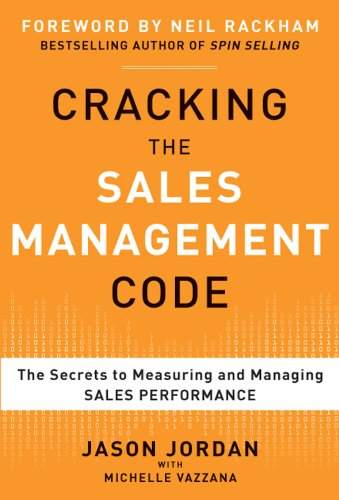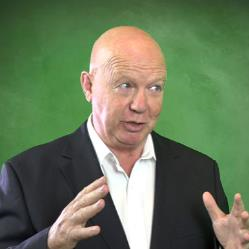 "Ensuring good sales behaviour with customers is critical for success" - A John Smibert discussion with Tony Hughes.
"Ensuring good sales behaviour with customers is critical for success" - A John Smibert discussion with Tony Hughes.
We need our salespeople to engage with our customers in a constructive and positive manner with their underlying intent being to help that customer achieve their desired outcomes.
And yet too often, we as sales managers, unwittingly encourage the opposite behaviour through our dialog with our sales team and through the questions we ask them about the deals they are working on.
 In this discussion I ask sales leadership guru Tony Hughes what his thoughts are on the subject.
In this discussion I ask sales leadership guru Tony Hughes what his thoughts are on the subject.
Tony told me that in his view "sales management is the weak link in the revenue chain in most organisations".
He said sales managers are "either spread really thin or they're trying to manage by results". "They need to ask their team members the questions that will focus the salesperson on where we're providing value for the client".
He emphasised that a sales manager's primary responsibility is to help their salespeople to elevate the conversations they are having with their clients, focusing more on business outcomes and less on product and service based solutions.
And yet much of our management behaviour does not reinforce this need.
See the full interview below to learn more.
************
Tony is a leading author and keynote speaker in the world of B2B sales and sales leadership. He is well known for his strategic selling book "The Joshua Principle" and for the RSVPselling methodology.
See more of the 'TALKING SALES' series here
Interview
John: Hey followers, thank you very much for coming back, I've got Tony Hughes with me again - welcome, Tony!
Tony: Hey, John - good to be here!
John: We just had a discussion a while ago about forecasting, and we talked a lot about the mechanics of forecasting, how to make it work, aligning with the buyer journey and all that sort of stuff. One of the things I want to delve into a little bit is behaviour of the sales manager in driving behaviour of the salesperson to the customer, because too often I hear salespeople pulling the team together or going to the individual and saying, "How big is it and when is it going to close?" You know what? That's when the salesperson then goes out to the customer and asks those two questions, and they're not customer-oriented questions, so we drive the wrong behaviour with the questions we ask of the salesperson. What do you think about that?
Tony: You're dead right, it does drive the wrong behaviour. I really believe that sales management is the weak link in the revenue chain in most organisations.
John: I've heard you say that many times, and I understand.
Tony: Yes, and it comes from a few places, they're either spread really thin or they're trying to manage by results. I really encourage everybody watching this to get and buy the book by Jason Jordan and his partner Michelle, called Cracking the Sales Management Code.
trying to manage by results. I really encourage everybody watching this to get and buy the book by Jason Jordan and his partner Michelle, called Cracking the Sales Management Code.
John: Brilliant book.
Tony: He makes the important point that we can't manage by results, you can't pull a revenue lever as a sales manager; we can only manage the activities that feed into sales objectives that then create the revenue. What sales managers need to do is they need to coach their salespeople and they need to ask them the questions to get the salesperson focused on where we're providing value for the client, and ask questions that uncover do we truly understand the customer's evaluation, selection, procurement and buying process.
John: To help the sales managers and the salespeople out there, let's talk about what some of those questions might be. I think, for example, instead of asking the question, "How big is it and when is it going to close?" what are the questions that are relevant to the customer? Questions that are of relevancy to the customer is what's the value of this decision to the customer? How is it going to change their business, how critical is it, and what compelling events are going to happen to make sure... They're all customer-oriented questions, right?
Tony: Yes.
John: Have you got other questions?
Tony: Instead of asking the salesperson when is he going to close, they should be asking the salesperson when does the customer need to be live, realising the benefits of the thing that we're selling them, the solution, product or service that we're selling them, and then say working back from that date, where are they at with their own timing and process for gaining approval. And we need to, as a secondary, follow-up question, ask what happens if that date slips, not the buying date but the going live date.
 John: Yes, and where they are in their buying process, and how can we help them to keep in line with that buying process and the timelines they got in mind. It's all about them, not about us and "I need to get an order."
John: Yes, and where they are in their buying process, and how can we help them to keep in line with that buying process and the timelines they got in mind. It's all about them, not about us and "I need to get an order."
Tony: Yes, that's so true. So sales managers need to drive the behaviour in their people through the questions that they ask about us serving the client, understanding the business outcomes they need to deliver. One of the big things I believe is that salespeople need to elevate the way that they sell, and the only way you elevate is to have conversations that earn an elevation in the role and the agenda. We need to be focused on what's the business outcome the customer is trying to achieve, where do they see the risks, and how can we help them with their business case to make sure they get return on investment.
John: And when do they need to start getting that return on investment, so the timeline and where they are in the process and so on. And I totally agree, if you're asking those sort of questions, talking about forecasting, you're going to get the right answers. You'll understand the time frame, you'll understand the size of the deal, the value to the customer and what that means to us and all those sorts of things, without asking how big is it and when is it going to close.
 Tony: Yes. And the other thing is we can go and talk to the customer on the basis that every month that they slip in implementing this solution we're trying to provide them, we know how much money it's costing them, so we know the opportunity cost in the customer not going ahead.
Tony: Yes. And the other thing is we can go and talk to the customer on the basis that every month that they slip in implementing this solution we're trying to provide them, we know how much money it's costing them, so we know the opportunity cost in the customer not going ahead.
Depending on whose statistics you believe, anywhere from a quarter to a third of sales out there get lost to client apathy or just to do nothing, and that helps solve that problem.
John: I totally agree. Yes, we need to be there to help the client, rather than drive the client to get what we need, which is an order.
Tony: Correct, we need to align rather than seek to apply pressure.
John: Love it, Tony - thank you very much! Hopefully there's great value out there, and if you need to know more about this subject or any other subject you want further discussion on, just let me know and I'll pull in either Tony or one of the other thought leaders we talk to. Thank you very much for listening - look forward to seeing you next time!
****************
More interviews with Tony Hughes:
***************

Your Invitation: I invite you to join the Sales Leader Forum group on LinkedIn where you can experience informative discussions with your peers and sales thought leaders on subjects like the one we have discussed here. I also invite you to subscribe to the
- Sales Leader Resource Centre here
- Sales Leader YouTube channel here (300+ sales leadership videos)
Please Share: If you valued this article, please share via your Twitter, LinkedIn, Google+ and Facebook social media platforms. I encourage you to join the conversation or ask questions. So feel free to add a comment on this post - I promise to respond. If inclined please follow my LinkedIn post page here.
Want to touch base? If you have questions please feel free to contact me - email: john.smibert(at)salesleaderforums.com, Phone: +61 404857893 or Skype: john.smibert